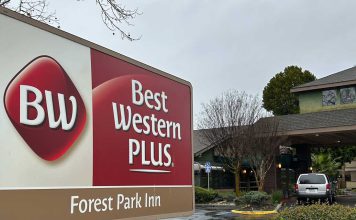Downtown restaurants that morph into liquor-injected dance halls
at night are in the cross-hairs of city leaders.
Gilroy – Downtown restaurants that morph into liquor-injected dance halls at night are in the cross-hairs of city leaders.
After months of effort by city staff and police to clamp down on late-night revelry in the city’s historic core, councilmen next week will debate if the city needs to further tighten regulation of downtown businesses.
Current regulations allow new restaurants to operate bars as “secondary uses,” but officials say a number of establishments along the Monterey Street corridor have continued serving booze and blaring music long after their kitchens close.
“You need to have a conversation with these businesses when they go in,” Mayor Al Pinheiro said. “That way, we don’t get into the predicament of having somebody come in under the auspices of a restaurant, and pretty soon turn into a bar or full-blown nightclub.”
One Mexican eatery in the heart of downtown has been a prime culprit, according to Pinheiro and City Planning Manager Bill Faus.
“The only place we’ve had concerns to the point where we’ve issued citations and gone down there with police has been Chips N’ Salsa,” Faus said. “In the last month or so, they have come around, but we do continue to monitor the situation.”
The restaurant at the corner of Sixth and Monterey streets took over a lease to operate out of Old City Hall more than a year ago. Owner Jim Angelopoulos, who did not return a call for comment, was allowed to serve up margaritas with burritos and other fare under a conditional use permit approved by the city.
But not long after opening in early 2006, the restaurant began luring late night crowds for dance parties and the occasional karaoke night.
“Every weekend is the same thing – complaints left and right,” said Bernie Wilder, manager of the Milias Apartments, which lies caddy corner to the restaurant.
Eight or nine residents complain on a regular basis to Wilder each week, he said.
“I just think they ought to have something to do with the noise there. The music is so loud it vibrates up into my building. We don’t need that. Our tenants can’t sleep at night. Sometimes we’re up at night until 1 or 2 in the morning. Two weeks ago, there was a big fight out there and there were six or seven cop cars out there at once.”
Officials say Chips N’ Salsa is not the only late-night party magnet. Restaurants such as Happy Dog Pizza, on Fifth Street, and Tenampa, near the intersection of First and Monterey streets, have also stretched the limits of their business licenses, Faus said. Happy Dog Pizza even had its liquor license suspended in April by the state’s Department of Alcohol and Beverage Control, as punishment for a bar fight in which three undercover ABC agents were attacked.
A call to the owner of Happy Dog Pizza was not returned and the owner of Tenampa could not be reached.
“The problem we’ve had is that these establishments, after a late hour like 9, 10, 11 o’clock at night, have shut down the restaurant business and continued the operation of the secondary uses,” Faus said. “They essentially morph a restaurant use into a bar use or dance-hall use, and that is not permissible under the ordinance.”
The city has taken pains in recent years to prevent new bars and night clubs from cropping up downtown. In 2005, officials codified a temporary moratorium on such businesses in the downtown historic core, though they allowed dance halls in other outlying areas by special permit. Happy Dog Pizza, for instance, lies just outside the boundary of the historic core, in an area known as the downtown “expansion district.” The area, whose boundary is marked by an alley a half block from Monterey Street, is allowed to have dance halls even in the absence of a food operation. The same law applies for the downtown gateway district that serves as home to Tenampa.
Dance hall permits do not come with authority to serve liquor, which remains controlled by special permits issued by the city’s Alcohol and Beverage Committee, made up of police and city staff. And while that committee might allow liquor permits for wine tasting rooms or restaurants in downtown, it has no intention of allowing new bars or night clubs that serve liquor.
“No new ABC permits for bar-only uses will be issued for the downtown,” Faus said.
That leaves a motley crew of bars and clubs downtown that have been “grandfathered” in under the law, and will not have to worry about competitors sprouting up as a result of the ban. The list includes bars such as the Aloha Club, the Oakwood Lounge and the Rio Nilo night club.
While officials can do little about existing businesses, they will decide next week if city staff should vet new restaurants more carefully or explain regulations more clearly when restaurants seek liquor permits. Pinheiro also suggested the possibility of giving city code enforcement officers added regulatory power.
“You look at Chips N’ Salsa, Rio Nilo, and some of the things that are happening and it’s very hard to understand that that has a positive impact on our downtown,” Pinheiro said. “Not to say that people should not have a place where they can have those dances, don’t get me wrong. I’m not saying to ban that, but I’m saying there’s an appropriate location for those things.”













